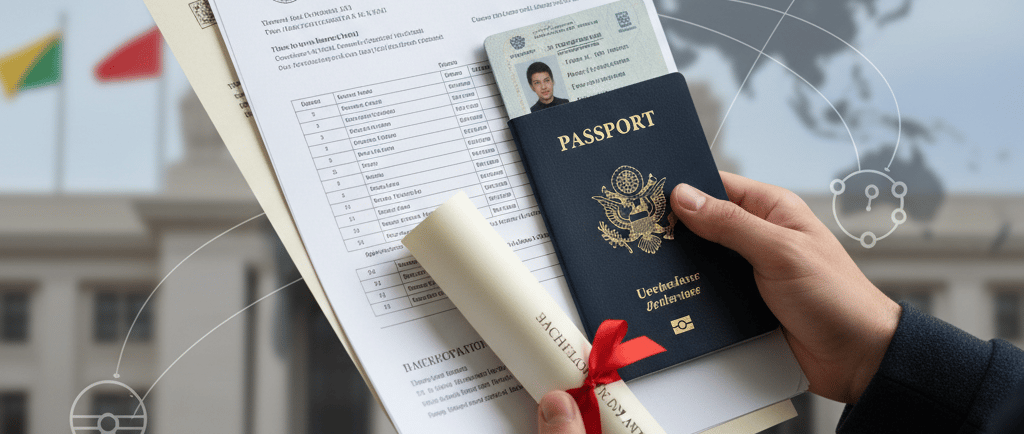Don't Forget Your Originals: Embassy Verification for Study Abroad
Discover why original documents are crucial for embassy verification when studying abroad. This guide helps you navigate the requirements for a smooth application process.
Viral Gala
10/5/20253 min read


🔑 Stop, Don't Photocopy! Why Your Original Documents Are the Non-Negotiable Key to Studying Abroad
You've done the hardest part: You got accepted! The feeling is incredible—new culture, new campus, a whole new life waiting.
But before you start packing your hoodies, there's one final, high-stakes step: Embassy Verification. This is the moment your paperwork gets the ultimate security check.
Many students risk their entire visa timeline over one simple oversight: they don't bring the originals. In our digital world, it feels old-fashioned, but for embassies, your original document is your proof of truth.
Here’s why those seemingly "old-school" papers are absolutely vital to secure your study visa, and why counterfeits or simple photocopies won't cut it.
5 Reasons Your Originals Are Your Best Defense 🛡️
Think of the embassy as your final gatekeeper. They have to be certain you are who you say you are and that your achievements are real. Your original documents are the only tools that give them that certainty.
1. Your Defense Against Fraud: The Hidden Security Code
Your degree isn't just printed on regular paper! It has watermarks, embossed seals, unique paper fibers, and security threads designed to be impossible to fake. A photocopy, no matter how good, flattens and hides these security features. By demanding the original, embassies maintain a robust defense against fraud, protecting the integrity of your new school and country.
2. Clarity Eliminates Costly Errors 🔎
Imagine a faint mark or blurry detail on a photocopy of your transcript. That small illegible detail can cause the consular officer to pause, flag your application, and launch an inquiry. Original documents offer crystal clarity. They prevent misinterpretation of crucial dates, grades, or names, saving you from stressful delays that could threaten your enrollment deadline.
3. The Legal Mandate: No Exceptions Allowed 🏛️
The requirement for originals isn't arbitrary; it's written into international law and immigration frameworks. For instance, the Hague Apostille Convention—used for many international documents—requires legalization on the original public document. By presenting the original, you instantly demonstrate your respect for the legal process. (Learn more about the MEA's stance on original document attestation).
4. Direct Comparison with the Source 📞
When an embassy needs to verify a document, they often cross-reference it with the issuing body (your university or government agency). The original document, with its unique characteristics, allows for a definitive and immediate confirmation of legitimacy. It speeds up the process because there is absolutely no room for doubt.
5. Consular Trust: Show You're Serious ✔️
Ultimately, the final decision rests with the consular officer. Providing originals demonstrates your thoroughness and attention to detail. It says, "I take this application seriously, and I have nothing to hide." This level of preparation leaves a positive impression, potentially streamlining the review process and getting you to that final, sought-after stamp faster!
Your Action Plan: What Papers to Prepare Now
Don't wait until the last minute! Assume these documents must be ready in their original, unlaminated state for Embassy submission:
Academic Proofs: Degrees, Diplomas, Transcripts, and Mark Sheets.
Identity & Status: Birth Certificate, Passport, and Marriage/Divorce Certificates.
Financial Proofs: Official Bank Statements and Scholarship/Sponsor Letters.
⚠️ A Crucial Warning for Students: If any of your vital certificates are laminated, they will likely be rejected for not allowing attestation or verification. Submitting fake or forged documents can lead to an immediate visa refusal and a multi-year ban from applying again. (See the consequences of misrepresentation on Canada's official site).
Don't risk your admission! Seek professional services (like Spandan De-Lamination's patented laser technology) to safely restore your originals and ensure they are ready for the embassy desk.
Your dream of studying abroad is worth the extra effort. Get those originals sorted, and get ready for your international academic adventure! ✈️
Contact Viral Gala (360 vr photography)
If lamination is the roadblock to your study visa:
Contact Viral Gala: +91 99203 22366
Lamination Removal Site: https://www.howtoremovelamination.com/
Company Websites: 360vrphotography.com and 360vrphotography.in
